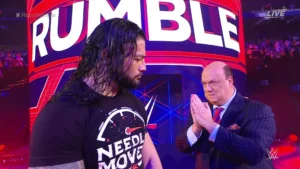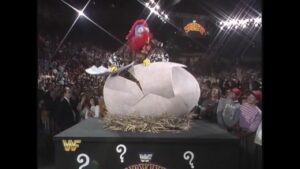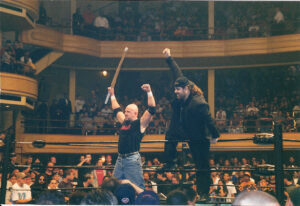When it comes to handheld gaming, the name that immediately comes to mind is Nintendo. From its series of Game and Watch devices dating back to the 1980s to the Nintendo 3DS, the company’s portable offerings were arguably just as important as the ones they provided via home consoles. This isn’t to say that competition didn’t exist. Over the years, the likes of the Sega Game Gear and Atari Lynx found their way into the fray. However, our focus in this piece will be Sony’s first true handheld outing. Let’s take a look at the PSP, the PlayStation Portable, and the wrestling video games that followed.

The PlayStation Portable (PSP)
The year was 2004. The Nintendo DS had just released that November and was slowly but steadily building momentum. While it took time for this new system to truly become legendary, Nintendo remained king of the handheld market. This was one of the reasons why the reveal and eventual release of the Sony PlayStation Portable was noteworthy. During this seventh generation of gaming, it seemed like Nintendo had some sizable competition in the form of the PSP.
One of the reasons the PSP caught the attention of many was its versatility. Ultimately, the DS was primarily a gaming system; it couldn’t be used to listen to music or watch movies, to name a few examples. The PSP had its own library of games, but what made it stand out was its various multimedia features. It also came with a sleek interface, making it feel that much more like a miniature computer. From the get-go, the PSP was met with praise.

It also didn’t hurt that the PSP came with a number of strong titles. “Daxter” was one of the first big hits for the platform, but it also had installments in established series including “God of War” and “Metal Gear Solid.” Physical media came in the form of universal media discs, whereas DS media came as smaller game carts. The PlayStation Network allowed users to expand their libraries with titles ranging from original software to PlayStation classics. Compared to the DS, the PSP appeared cutting edge. Nonetheless, the DS thrived in the handheld market while the PSP slowly but surely fizzled out.
There were multiple sticking points that worked against the PSP. Such downsides included the UMD format, which not only made games load slower but rendered development trickier. It also suffered from shoddy marketing, including the infamous commercial with the cartoon squirrels. Lastly, while Sony was a big company, it didn’t have the same customer loyalty Nintendo built throughout the years. These were just a few reasons the PSP failed against the DS, though the former became incredibly popular in regard to homebrewing.
Much like video game systems discussed in the past, the PSP had its own array of wrestling video games. While these may not have been as popular as the titles found on Sony’s home consoles, they are worth discussing nonetheless. In fact, gamers that still have their PSPs may want to look into these titles if the prices are right. Without any further delay, let’s get into some of the most memorable wrestling games on Sony’s first portable system.

Def Jam Fight for NY: The Takeover
Last month, in our look at wrestling video games on the Playstation 2, we covered “Def Jam: Fight for NY.” The “Def Jam Vendetta” series was an interesting take on wrestling and fighting games in general, bringing popular figures from the world of hip hop together to fight it out. The series was so popular that it found its way to various platforms, including the PSP. This brings us to the series’ only portable outing. “Def Jam Fight for NY: The Takeover” was published by Electronic Arts and released in late 2006.
One of the notable aspects of “Def Jam Fight for NY: The Takeover” is presentation. Despite being on the PSP, Electronic Arts didn’t have to sacrifice much in the way of graphics. Furthermore, it plays as smoothly as fans of the series would expect. The game’s combat was amped up and included various venues. It also included a creation mode for those looking to use their own original fighters, though it boasted a solid roster out of the gate. Such recognizable names included Method Man, Ludacris, and Busta Rhymes.
Much like with “Def Jam Vendetta” games of the past, this isn’t a typical wrestling romp. In fact, it prioritizes fighting and brawling, which may be of interest to those looking for something out of the ordinary. This is especially true for players heavily involved in hip hop culture. When it comes to wrestling video games on the PSP, “Def Jam Fight for NY: The Takeover” is an underrated gem that deserves a look.

WWE All Stars
Speaking of games that have been touched on in the past, enter “WWE All Stars.” A couple of weeks ago, I touched upon this in my look at wrestling video games on the Nintendo DS and 3DS systems. “WWE All Stars” made its way across numerous platforms, but given the technical limitations of portable systems, I always found these versions to be the most interesting. How can developers fit these console experiences onto comparatively limited hardware?
“WWE All Stars” holds the distinction of being the final wrestling video game to be released on the PSP and what a way for this run to end. Where this game gets things right is in how it plays. “WWE All Stars” is a smooth experience that embraces the outlandish aspects of professional wrestling. With wrestlers performing incredible leaps and bone-crushing maneuvers, “WWE All Stars” can best be described as an arcade game in the palm of your hands. Check out my look at wrestling games on the DS and 3DS for further insight.
It can’t be denied that there were sacrifices made to the PSP version of “WWE All Stars.” Visually, it simply doesn’t compare to the home console versions. It also lacks substantial multiplayer options; online play was a no-go when this PSP title released. With that said, “WWE All Stars” provides an identical gaming experience for those on the go. Give this title a look if you’re interested in a deviation from the standard wrestling game formula.
WWE SmackDown vs. RAW 2006 for the PSP
The PlayStation 2 brought life to the “WWE SmackDown vs. RAW” series, but it didn’t stay on said platform forever. In fact, PSP owners were inundated with versions of subsequent games, though their quality varied. A cursory glance on Metacritic will show that some titles were rated better than others. Perhaps the best game in the series that hit the PSP was the first. “WWE SmackDown vs. RAW 2006” for the PSP released in North America and Europe in 2005.
As the first “SmackDown” game to release on the PSP, “WWE SmackDown vs. RAW 2006” features enough differences from its console counterpart to stand out. One such feature was its connectivity to the PS2 version. If both versions synced up, the user could unlock Jake “The Snake” Roberts as a playable character. It also featured exclusive minigames under “Arcade Mode.” Despite how simple these minigames were, such as Poker, they couldn’t be played on the PS2.
Outside of these additions, “WWE SmackDown vs. RAW 2006” on the PSP provided a similar experience to the PS2. As one may imagine, the handheld version doesn’t hold up to its console counterpart. Furthermore, the PSP version was criticized for its long loading times, which will be tough to adjust to if this game was played for the first time today. With these criticisms aside, a solid argument can be made that “WWE SmackDown vs. RAW 2006” is the best wrestling video game on the PSP.
Though the PSP failed to supersede Nintendo’s line of handhelds, it was still a solid portable that many gamers enjoy to this day. As stated earlier, it developed a reputation as a homebrew beast. Anyone looking to get into this niche of gaming may wish to pick up a used PSP. Next time, we will take a leap back in time as we look back at wrestling video games that were popular in the arcades.
Check out past entries from the “Revisiting Wrestling Video Games” series!
Stay tuned to the Last Word on Pro Wrestling for more on this and other stories from around the world of wrestling, as they develop. You can always count on LWOPW to be on top of the major news in the wrestling world, as well as to provide you with analysis, previews, videos, interviews, and editorials on the wrestling world.






